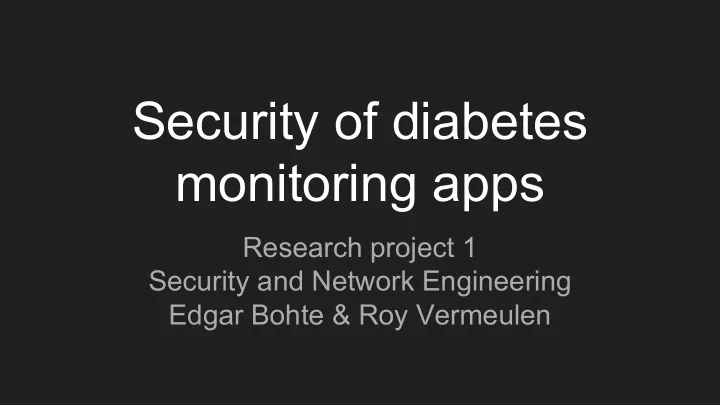

Security of diabetes monitoring apps Research project 1 Security and Network Engineering Edgar Bohte & Roy Vermeulen
Why diabetes? 2
3
The upside 4
Smartphone app security 5
Health data confidentiality 6
Diabetes data integrity ● Hyperglycaemia ● Hypoglycaemia 7
Research question ● What is the current state of security in diabetes blood glucose monitoring apps? 1. How can an unauthorized third party derive data from the glucose monitoring apps? 2. Which data can be derived from these apps by an unauthorized third party? 3. How can an unauthorized third party alter the data in these apps? 8
Selecting apps ● 3 apps ● Only android apps ● Selected by popularity 9
Emulation ● Genymotion a) ● Android 8.0 Oreo a) 10
c) Tools b) k) d) e) f) 11
OWASP framework o) 12
M1: Improper Platform Usage M1: Improper Platform Usage App 1 App 2 Activities every app can call App 3 Activities every app can call 13
M2: Insecure Data Storage M2: Insecure Data Storage App 1 Authentication is in logs App 2 Database not encrypted App 3 Glucose level in logs 14
M3: Insecure Communication M3: Insecure Communication App 1 Uses HTTP connection App 2 App 3 15
M4: Insecure Authentication M4: Insecure Authentication App 1 Authentication token duration valid App 2 Not able to log out App 3 Authentication token generation 16
M5: Insufficient Cryptography 17
M6: Insecure Authorization M6: Insecure Authorization App 1 Insecure link generation for sharing data App 2 App 3 Authorization check export archived data 18
Link generation ● Character space a-z A-Z 0-9 ● 4 characters long ● http://example.link/ i1Db ● http://example.link/ j1Db . . . ● http://example.link/ 91Db ● http://example.link/ a2Db 19
M6: Insecure Authorization M6: Insecure Authorization App 1 Insecure link generation for sharing data App 2 App 3 Authorization check export archived data 20
M9: Reverse Engineering M9: Reverse Engineering App 1 App 2 App 3 21
Scoring overview M1 M2 M3 M4 M6 M9 App 1 App 2 App 3 22
App 1 exploit ● Authentication token in logs ● Duration Authentication token stays valid Access level Requirements malicious app or access physical read and write device 23
App 2 exploit ● Get data via unencrypted database Access level Requirements read and write root 24
App 3 exploit ● Get unencrypted email and password ● Use them to get authentication code Access level Requirements read and write root ● Get data via export archived data Access level Requirements read Connect to server and an account 25
Conclusion ● What is the current state of security in diabetes blood glucose monitoring apps? ● Storage and authentication biggest problem ● Obtain medical data from all apps ● Modify medical data 2 out of 3 apps ● Most found vulnerabilities rely on physical access or malicious app 26
Future work ● Other OS (iOS) ● More apps (paid for apps) ● Invasive server testing ● Apps connecting to sensor 27
Thank you for your attention image sources: a) images by Genymotion (https://www.genymotion.com/) b) image from kali linux tutorials (https://kalilinuxtutorials.com/mobsf-mobile-security-framework/) c) image from android community (https://androidcommunity.com/how-to-getting-adb-on-your-pc-without-installing-full-android-sdk-20180307/) d) image by Qualys (https://community.qualys.com/community/ssllabs) e) image from effect hacking (http://www.effecthacking.com/2016/01/drozer-android-security-assessment-framework.html) f) image from ehacking.net (https://academy.ehacking.net/p/burp-suite-web-penetration-testing) 28
Recommend
More recommend